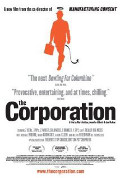
Directed by
Mark Achbar & Jennifer Abbott
145 minutes
Rated PG
Reviewed by
Bernard Hemingway

The Corporation
Synopsis: Based on The Corporation: The Pathological Pursuit of Profit And Power this documentary takes a wide-ranging look at the nefarious doings of the modern corporation via a combination of interviews and stock footage."The love of money is the root of all evil" (1 Timothy 6:10). In essence this is the unsurprising message of this award-winning documentary. That it has collected so many awards given that corporations hold such a hegemonic position in our contemporary world illustrates the essential problem that this documentary hovers around, but does not come to grips with -that corporate power depends not upon the support of an educated and morally-enlightened middle class minority but upon the unreflective compliance of mass society (a theme which was explored extensively in the 1992 documentary made by Achbar with Peter Wintonick, Manufacturing Consent). In this respect corporations are not just hand-in-glove with totalitarian regimes, as this film suggests, they are totalitarian entities themselves. The Nike swoosh and the Nazi swastika are but two different brands. This is best illustrated here by a woman who works for one of America's biggest marketing companies, a specialist in marketing to children. When asked by Achbar if she thought that what she did was ethical she replies (in essence): "I don't know, but if we sell more toys then we've done our job". She would have made an excellent office manager at Dachau. Nike's "Just Do It" catch-cry may be the defining mantra of corporate capitalism but it could just as well be the over-arching declaration of any totalitarian regime.
The Corporation offers much on which to muse although in itself provides little more than a litany of well-known corporate sins - the environmental destruction, the sweatshops, the lies and cover-ups and so on. Despite being divided by topic headings the final result is like a big noticeboard covered with news clippings. It is collative rather than investigative and although it does have a number of talking heads from within and without the corporate world there is little sense of any inquiry but more a grab bag of illustrations of the main corporate-is-bad thesis. The prominent claim that the underpinning personality of the corporation is pathological is not explored in any depth, nor is there any insight into why the corporate mentality has come to dominate our modern mind-set. The directors carry their illustrative proclivity too far, unnecessarily matching the spoken word with complementary footage, an annoying device which also gratuitously extends the length of the film
Documentaries of this type have an understandable problem with finding an audience and so need to broaden their appeal. Thus 50s cartoons, TV ads and training films are used to jolly up what amounts to a depressing account of our post-modern world. But more fundamentally they need to address the criticism that they are "glass half-empty" nay-sayers. To this effect they appear to present a variety of views but this seems more for the sake of appearing to be balanced than as justified by their evidence or evident sympathies. They proffer a wonderful antidote to the standard corporate apologist in Ray Anderson, the CEO of the world's largest carpet manufacturer, an articulate and moving spokesperson for sustainable business practice and they close with an upbeat suggestion from Michael Moore that their film will make a difference. Now that's effective marketing.

Want more about this film?


Want something different?




